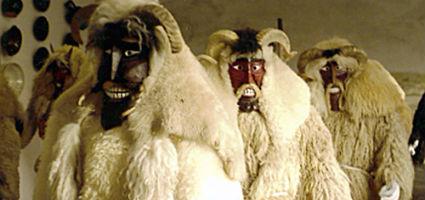2024. April 18. Thursday
Busó House - Mohács
 |
Address: 7700, Mohács Kossuth L. u. 54.
Phone number: (69) 302-677
Opening hours: 01.01-31.12.
|
The Busó festivities is a tradition stemming from a few thousand-year-old nature-praising belief system: its source was the worship of the mythological figure of the God Pan. It was the celebration of the ancient tribes, pastors, forest men from the Adriatic to the Balaton. It is a wonder that against all prohibitions of the Church and the unprofessional treatment the tradition is still preserved nowadays.
The Busó festivities is a celebration of farewell to Winter, a welcome of Spring, the renewal of nature, birth, and the progeny of cattle. It is partly the promise of love, embrace, lust, growing up, becoming a man, belief in the future, happiness, friendship, and the will to live as well as overcoming demons.
Until the recent past, it was only the celebration of the people of Mohács. According to the oral tradition, the Busó who crossed the river on boats chased the Turkish away from the area of Mohács in 1687. This has never been proven but possible since it is well known that the Turkish are very suspicious and the frightening Busós looked like the devil especially when the Turkish saw an army of them. According to traditions, the Turkish fled in panic when they saw the horrible army.
The Busós dressed in fur coat turned inside out tied with a string. They wore white pants, sometimes stuffed with hey. Sometimes they also wore motley stockings and boots tied across with laces. The most important part of the cloths was the mask carved of red sallow usually painted dark red. It always showed a human face, with special characters of emotions. In olden times, their owners carved the masks, nowadays mask makers make them ornamented with ram horns in many cases. The Busós also carried a satchel, a sheep bell, and the 'weapons' like a rattle and a mace with them.
The Busó never took off his mask; he never uncovered himself. It was the most important rule, which was always kept. He even changed his way of walking so nobody would recognize him. He did not speak only gesticulated or sounded a bao-bao noise by which he tried to frighten the people who dared to approach him. Busós were roaming the streets with their noisy instruments. They hug every woman who they happened to meet. Music was played and drink was flowing. They danced, had fun, and enjoyed themselves over three nights and three days from Sunday until Pancake Day.
The Busó festivities is a celebration of farewell to Winter, a welcome of Spring, the renewal of nature, birth, and the progeny of cattle. It is partly the promise of love, embrace, lust, growing up, becoming a man, belief in the future, happiness, friendship, and the will to live as well as overcoming demons.
Until the recent past, it was only the celebration of the people of Mohács. According to the oral tradition, the Busó who crossed the river on boats chased the Turkish away from the area of Mohács in 1687. This has never been proven but possible since it is well known that the Turkish are very suspicious and the frightening Busós looked like the devil especially when the Turkish saw an army of them. According to traditions, the Turkish fled in panic when they saw the horrible army.
The Busós dressed in fur coat turned inside out tied with a string. They wore white pants, sometimes stuffed with hey. Sometimes they also wore motley stockings and boots tied across with laces. The most important part of the cloths was the mask carved of red sallow usually painted dark red. It always showed a human face, with special characters of emotions. In olden times, their owners carved the masks, nowadays mask makers make them ornamented with ram horns in many cases. The Busós also carried a satchel, a sheep bell, and the 'weapons' like a rattle and a mace with them.
The Busó never took off his mask; he never uncovered himself. It was the most important rule, which was always kept. He even changed his way of walking so nobody would recognize him. He did not speak only gesticulated or sounded a bao-bao noise by which he tried to frighten the people who dared to approach him. Busós were roaming the streets with their noisy instruments. They hug every woman who they happened to meet. Music was played and drink was flowing. They danced, had fun, and enjoyed themselves over three nights and three days from Sunday until Pancake Day.
|
Programmes
|
|